初中易混词汇辨析
- 格式:pdf
- 大小:26.06 KB
- 文档页数:12
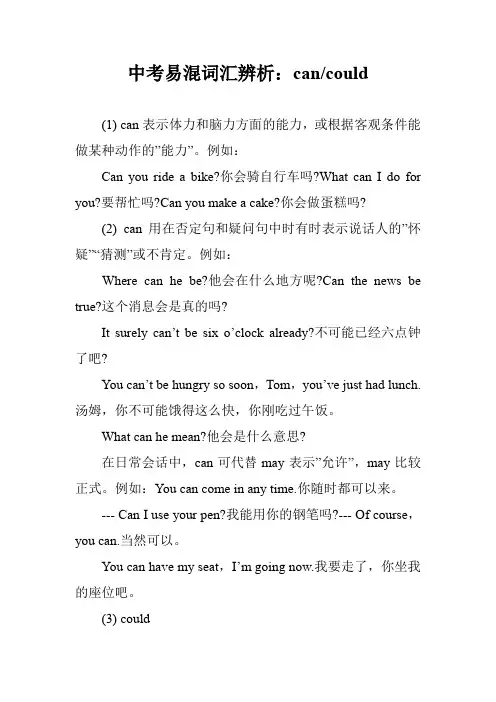
中考易混词汇辨析:can/could(1) can表示体力和脑力方面的能力,或根据客观条件能做某种动作的”能力”。
例如:Can you ride a bike?你会骑自行车吗?What can I do for you?要帮忙吗?Can you make a cake?你会做蛋糕吗?(2) can用在否定句和疑问句中时有时表示说话人的”怀疑”“猜测”或不肯定。
例如:Where can he be?他会在什么地方呢?Can the news be true?这个消息会是真的吗?It surely can’t be six o’clock already?不可能已经六点钟了吧?You can’t be hungry so soon,Tom,you’ve just had lunch.汤姆,你不可能饿得这么快,你刚吃过午饭。
What can he mean?他会是什么意思?在日常会话中,can可代替may表示”允许”,may比较正式。
例如:You can come in any time.你随时都可以来。
--- Can I use your pen?我能用你的钢笔吗?--- Of course,you can.当然可以。
You can have my seat,I’m going now.我要走了,你坐我的座位吧。
(3) couldcould 是can的过去式,表示过去有过的能力和可能性(在否定和疑问句中)。
例如:The doctor said he could help him.(能力)医生说他能帮助他。
Lily could swim when she was four years old.(能力)当丽丽四岁的时候她就会游泳。
At that time we thought the story could be true.(可能性)那时我们以为所说的可能是真的。
could可代替can表示现在时间的动作,但语气较为婉转。
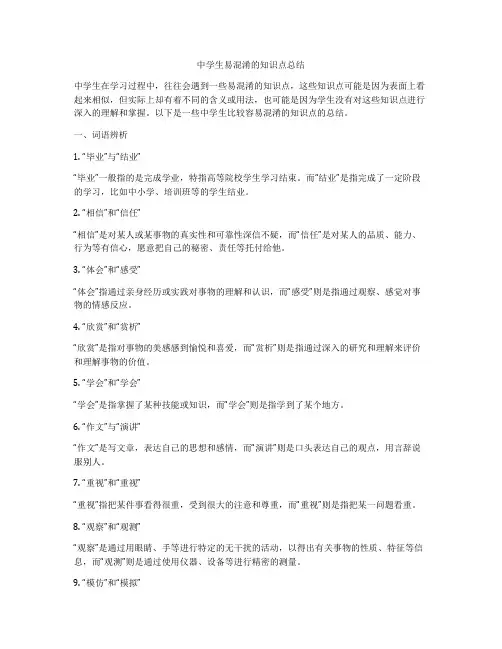
中学生易混淆的知识点总结中学生在学习过程中,往往会遇到一些易混淆的知识点,这些知识点可能是因为表面上看起来相似,但实际上却有着不同的含义或用法,也可能是因为学生没有对这些知识点进行深入的理解和掌握。
以下是一些中学生比较容易混淆的知识点的总结。
一、词语辨析1. “毕业”与“结业”“毕业”一般指的是完成学业,特指高等院校学生学习结束。
而“结业”是指完成了一定阶段的学习,比如中小学、培训班等的学生结业。
2. “相信”和“信任”“相信”是对某人或某事物的真实性和可靠性深信不疑,而“信任”是对某人的品质、能力、行为等有信心,愿意把自己的秘密、责任等托付给他。
3. “体会”和“感受”“体会”指通过亲身经历或实践对事物的理解和认识,而“感受”则是指通过观察、感觉对事物的情感反应。
4. “欣赏”和“赏析”“欣赏”是指对事物的美感感到愉悦和喜爱,而“赏析”则是指通过深入的研究和理解来评价和理解事物的价值。
5. “学会”和“学会”“学会”是指掌握了某种技能或知识,而“学会”则是指学到了某个地方。
6. “作文”与“演讲”“作文”是写文章,表达自己的思想和感情,而“演讲”则是口头表达自己的观点,用言辞说服别人。
7. “重视”和“重视”“重视”指把某件事看得很重,受到很大的注意和尊重,而“重视”则是指把某一问题看重。
8. “观察”和“观测”“观察”是通过用眼睛、手等进行特定的无干扰的活动,以得出有关事物的性质、特征等信息,而“观测”则是通过使用仪器、设备等进行精密的测量。
9. “模仿”和“模拟”“模仿”是指按照某种模式或者样式去做,而“模拟”则是指通过实际操作或者设计模型来推测事物的性质。
10. “独立”和“自立”“独立”指的是个人良好地完成某项工作,而“自立”是指在生活中不依靠别人。
二、词语误用1. “有用”和“有用”“有用”是形容词,表示有实际的效果和作用,而“有用”是动词,表示使用、施展等。
2. “晚上”和“夜晚”“晚上”是指中午以后到次日清晨之间的时间段,而“夜晚”则是指天黑以后到天亮之前的时间段。
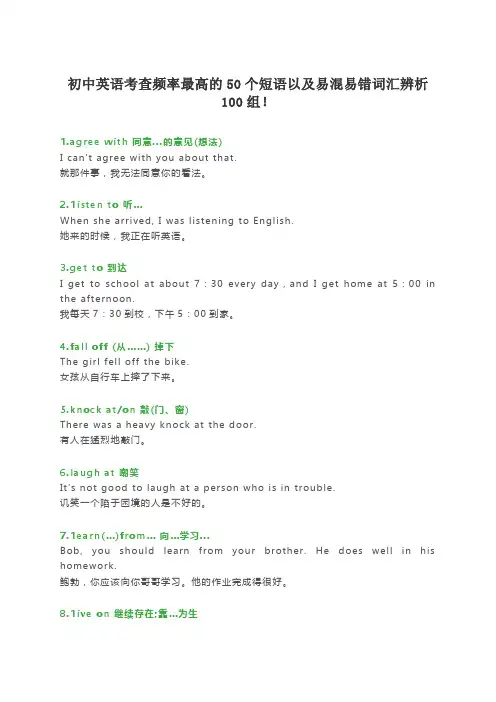
初中英语考查频率最高的50个短语以及易混易错词汇辨析100组!1.agree with 同意...的意见(想法)I can’t agree with you about that.就那件事,我无法同意你的看法。
2.1isten to 听…When she arrived, I was listening to English.她来的时候,我正在听英语。
3.get to 到达I get to school at about 7:30 every day,and I get home at 5:00 in the afternoon.我每天7:30到校,下午5:00到家。
4.fall off (从……) 掉下The girl fell off the bike.女孩从自行车上摔了下来。
5.knock at/on 敲(门、窗)There was a heavy knock at the door.有人在猛烈地敲门。
ugh at 嘲笑It’s not good to laugh at a person who is in trouble.讥笑一个陷于困境的人是不好的。
7.1earn(…)from…向…学习...Bob, you should learn from your brother. He does well in his homework.鲍勃,你应该向你哥哥学习。
他的作业完成得很好。
8.1ive on 继续存在;靠…为生People in my hometown live on rice.我家乡的人们靠大米为生。
9.1ook after 照顾,照看I must look after my old grandma when my parents are not at home.父母不在家时,我必须照顾我的老奶奶.10.help…with 帮助…做…My friend helps me with my English study.我的朋友帮助我学习英语。
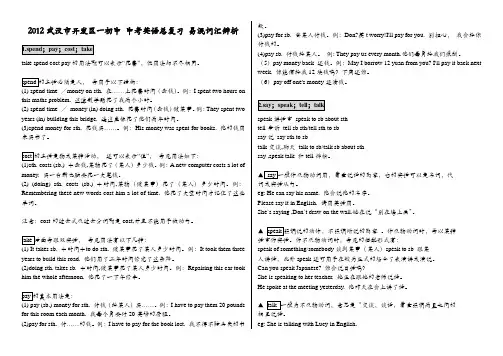
2012武汉市开发区一初中 中考英语总复习 易混词汇辨析take spend cost pay 的用法都可以表示“花费”,但用法却不尽相同。
常用于以下结构:(1) spend time /money on sth. 在……上花费时间(金钱)。
例:I spent two hours on this maths problem. 这道数学题花了我两个小时。
(2) spend time / money (in) doing sth. 花费时间(金钱)做某事。
例:They spent two years (in) building this bridge. 造这座桥花了他们两年时间。
(3)spend money for sth. 花钱买……。
例:His money was spent for books. 他的钱用来买书了。
还可以表示“值”, 常见用法如下: (1)sth. costs (sb.) +金钱,某物花了(某人)多少钱。
例:A new computer costs a lot of money. 买一台新电脑要花一大笔钱。
(2) (doing) sth. costs (sb.) +时间,某物(做某事)花了(某人)多少时间。
例:Remembering these new words cost him a lot of time. 他花了大量时间才记住了这些单词。
注意:cost 的过去式及过去分词都是cost,并且不能用于被动句。
常见用法有以下几种:(1) It takes sb. +时间+to do sth. 做某事花了某人多少时间。
例:It took them three years to build this road. 他们用了三年时间修完了这条路。
(2)doing sth. takes sb.+时间,做某事花了某人多少时间。
例:Repairing this car took him the whole afternoon. 他花了一下午修车。
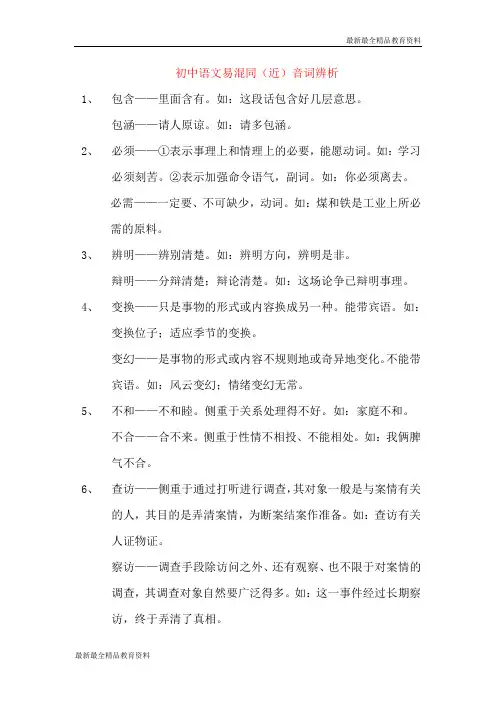
初中语文易混同(近)音词辨析1、包含——里面含有。
如:这段话包含好几层意思。
包涵——请人原谅。
如:请多包涵。
2、必须——①表示事理上和情理上的必要,能愿动词。
如:学习必须刻苦。
②表示加强命令语气,副词。
如:你必须离去。
必需——一定要、不可缺少,动词。
如:煤和铁是工业上所必需的原料。
3、辨明——辨别清楚。
如:辨明方向,辨明是非。
辩明——分辩清楚;辩论清楚。
如:这场论争已辩明事理。
4、变换——只是事物的形式或内容换成另一种。
能带宾语。
如:变换位子;适应季节的变换。
变幻——是事物的形式或内容不规则地或奇异地变化。
不能带宾语。
如:风云变幻;情绪变幻无常。
5、不和——不和睦。
侧重于关系处理得不好。
如:家庭不和。
不合——合不来。
侧重于性情不相投、不能相处。
如:我俩脾气不合。
6、查访——侧重于通过打听进行调查,其对象一般是与案情有关的人,其目的是弄清案情,为断案结案作准备。
如:查访有关人证物证。
察访——调查手段除访问之外、还有观察、也不限于对案情的调查,其调查对象自然要广泛得多。
如:这一事件经过长期察访,终于弄清了真相。
7、处世——泛指人在社会上活动,跟人来往。
如:人心不古,处世不易。
处事——处理事务的意思,一般指对具体事务的处理。
如:他处事不利。
8、出生——胎儿从母体中分离出来。
如:甲子年出生。
出身——指个人早期的经历或身份。
如:工人出身。
9、篡改——用作伪的手段别有用心的改动或曲解(经典、理论、政策等)。
窜改——改动文字(成语、文件、古书等)。
如:他将“望洋兴叹”窜改成“望山兴叹”。
10、“采”与“彩”“采”与“彩”这两个同音字,字义有明显区别,不能混淆。
书报刊上常常“采”与“彩”不分,造成用词错误,如把“光彩”写成“光采”,“喝彩”写成“喝采”,“风采”写成“风彩”等等。
要区别“采”与“彩”,关键在于辨清这两个同音字的字义。
“采”主要表示人的容貌、姿态、神情和精神境界,如神采、风采、文采、神采奕奕、风采动人、无精打采、兴高采烈等。
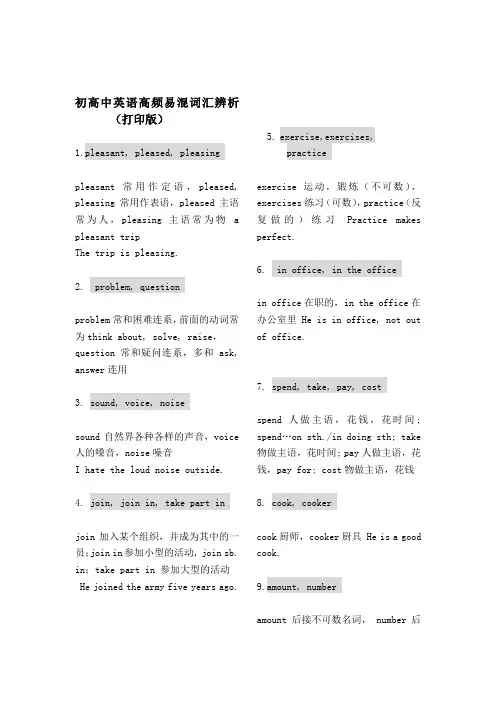
初高中英语高频易混词汇辨析(打印版)1.pleasant, pleased, pleasingpleasant常用作定语,pleased, pleasing常用作表语,pleased主语常为人,pleasing主语常为物 a pleasant tripThe trip is pleasing.2. problem, questionproblem常和困难连系,前面的动词常为think about, solve, raise,question常和疑问连系,多和ask, answer连用3. sound, voice, noisesound自然界各种各样的声音,voice 人的嗓音,noise噪音I hate the loud noise outside.4. join, join in, take part injoin加入某个组织,并成为其中的一员;join in参加小型的活动, join sb. in;take part in 参加大型的活动He joined the army five years ago.5.exercise,exercises,practiceexercise运动,锻炼(不可数),exercises练习(可数),practice(反复做的)练习Practice makes perfect.6. in office, in the officein office在职的,in the office在办公室里 He is in office, not out of office.7. spend, take, pay, costspend人做主语,花钱,花时间; spend…on sth./in doing sth; take 物做主语,花时间; pay人做主语,花钱,pay for; cost物做主语,花钱8. cook, cookercook厨师,cooker厨具 He is a good cook.9.amount, numberamount后接不可数名词, number后接可数名词 a number of students10. trip, journey, travel, voyagetravel是最常用的,trip指短期的旅途,journey指稍长的旅途,voyage 指海上航行 a three-day trip11. chick, chicken二者均可指小鸡,chicken还可以当鸡肉 The chicken is delicious.12. a number of, the number ofa number of许多,谓语动词用复数。
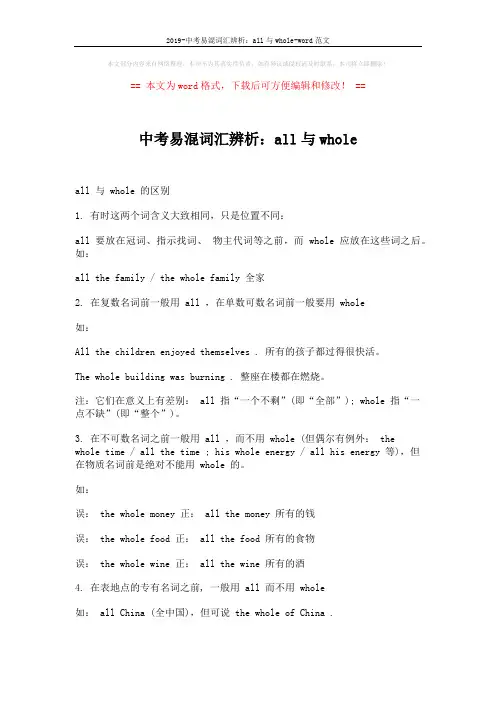
2019-中考易混词汇辨析:all与whole-word范文本文部分内容来自网络整理,本司不为其真实性负责,如有异议或侵权请及时联系,本司将立即删除!== 本文为word格式,下载后可方便编辑和修改! ==中考易混词汇辨析:all与wholeall 与 whole 的区别1. 有时这两个词含义大致相同,只是位置不同:all 要放在冠词、指示找词、物主代词等之前,而 whole 应放在这些词之后。
如:all the family / the whole family 全家2. 在复数名词前一般用 all ,在单数可数名词前一般要用 whole如:All the children enjoyed themselves . 所有的孩子都过得很快活。
The whole building was burning . 整座在楼都在燃烧。
注:它们在意义上有差别: all 指“一个不剩”(即“全部”); whole 指“一点不缺”(即“整个”)。
3. 在不可数名词之前一般用 all ,而不用 whole (但偶尔有例外: thewhole time / all the time ; his whole energy / all his energy 等),但在物质名词前是绝对不能用 whole 的。
如:误: the whole money 正: all the money 所有的钱误: the whole food 正: all the food 所有的食物误: the whole wine 正: all the wine 所有的酒4. 在表地点的专有名词之前, 一般用 all 而不用 whole如: all China (全中国),但可说 the whole of China .。
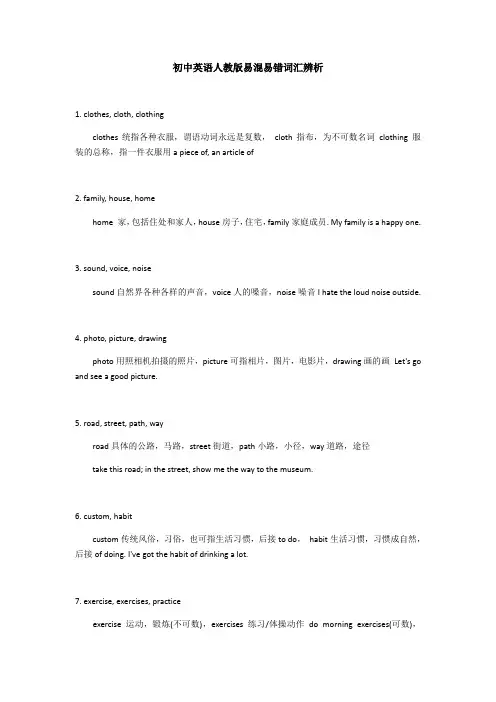
初中英语人教版易混易错词汇辨析1. clothes, cloth, clothingclothes统指各种衣服,谓语动词永远是复数,cloth指布,为不可数名词clothing 服装的总称,指一件衣服用a piece of, an article of2. family, house, homehome 家,包括住处和家人,house房子,住宅,family家庭成员. My family is a happy one.3. sound, voice, noisesound自然界各种各样的声音,voice人的嗓音,noise噪音I hate the loud noise outside.4. photo, picture, drawingphoto用照相机拍摄的照片,picture可指相片,图片,电影片,drawing画的画Let's go and see a good picture.5. road, street, path, wayroad具体的公路,马路,street街道,path小路,小径,way道路,途径take this road; in the street, show me the way to the museum.6. custom, habitcustom传统风俗,习俗,也可指生活习惯,后接to do,habit生活习惯,习惯成自然,后接of doing. I've got the habit of drinking a lot.7. exercise, exercises, practiceexercise运动,锻炼(不可数),exercises练习/体操动作do morning exercises(可数),practice(反复做的)练习Practice makes perfect.8. class, lesson作"课"解时,两者可以替换.指课文用lesson. 指班级或全体学生用class. lesson 6; class 59. speech, talk, lecturespeech指在公共场所所做的经过准备的较正式的演说,talk日常生活中的一般的谈话,讲话,lecture学术性的演讲,讲课 a series of lecture on…10. officer, officialofficer部队的军官,official政府官员an army officer11.work, job 二者均指工作。
![[课件]第一讲:中考易混淆词辨析1.pdf](https://uimg.taocdn.com/e6f8e88790c69ec3d5bb75c2.webp)
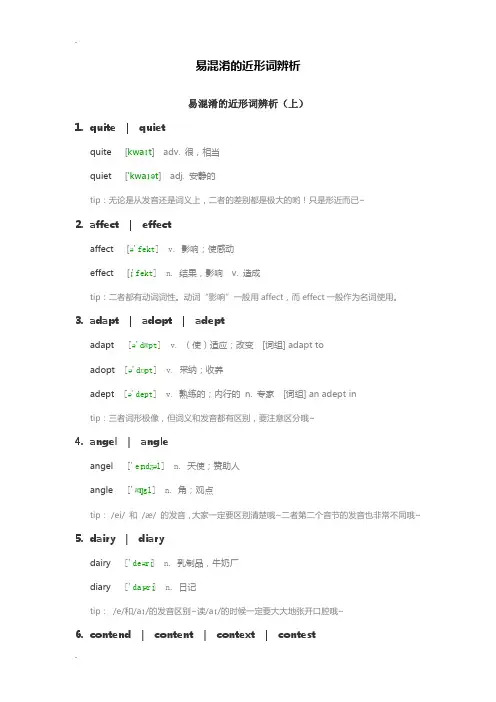
易混淆的近形词辨析易混淆的近形词辨析(上)1.quite | quietquite [kwaɪt] adv. 很,相当quiet ['kwaɪət] adj. 安静的tip:无论是从发音还是词义上,二者的差别都是极大的哟!只是形近而已~2.affect | effectaffect [ə'fekt] v. 影响;使感动effect [ɪ'fekt] n. 结果,影响v. 造成tip:二者都有动词词性。
动词“影响”一般用affect,而effect一般作为名词使用。
3.adapt | adopt | adeptadapt [ə'dæpt] v. (使)适应;改变[词组] adapt toadopt [ə'dɒpt] v. 采纳;收养adept [ə'dept] v. 熟练的;内行的n. 专家[词组] an adept intip:三者词形极像,但词义和发音都有区别,要注意区分哦~4.angel | angleangel ['eɪndʒəl] n. 天使;赞助人angle ['æŋgl] n. 角;观点tip:/ei/ 和/æ/的发音,大家一定要区别清楚哦~二者第二个音节的发音也非常不同哦~ 5.dairy | diarydairy ['deərɪ] n. 乳制品,牛奶厂diary ['daɪərɪ] n. 日记tip:/e/和/aɪ/的发音区别~读/aɪ/的时候一定要大大地张开口腔哦~6.contend | content | context | contestcontend [kən'tend] v. 奋斗;斗争;声称content ['kɒntent] n. 内容,要旨adj. 满足的context ['kɒntekst] n. 上下文,背景,语境contest ['kɒntest] n./v. 竞赛,争论tip: 巧记方法:con-有“聚众、一起”的意思,tend是“走向、倾向”,一起倾向就是“声称”;tent是帐篷,一起帐篷具有“空间”的含义,因此是“容量、内容”;text是文本,一堆文本就是“语境、上下文”;test是比赛,一起比赛就是“竞赛、争论”啦!7.principal | principleprincipal ['prɪnsəpl] n. 校长adj. 主要的,重要的principle ['prɪnsəpl] n. 原则;原理;信条tip:二者的发音倒是没啥区别,但注意拼写哦,一个是pal,一个是ple~8.implicit | explicitimplicit [ɪm'plɪsɪt] n. 暗示的;含蓄的explicit [ɪk'splɪsɪt] n. 明确的;清楚的;详尽的tip:二者互为反义词。
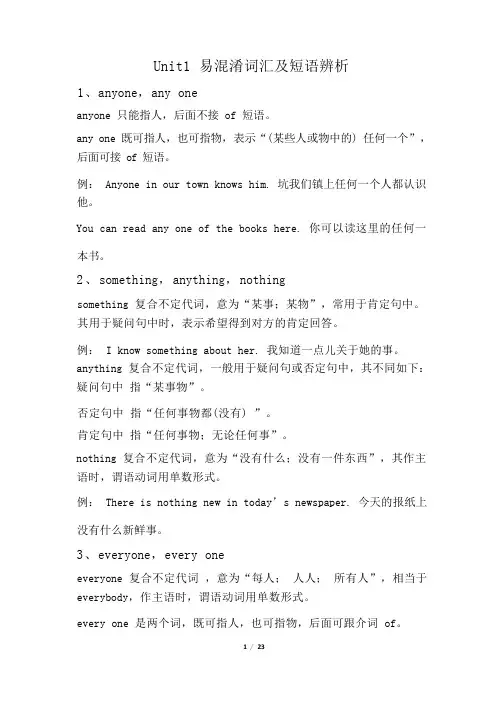
Unit1 易混淆词汇及短语辨析1、anyone,any oneanyone 只能指人,后面不接 of 短语。
any one 既可指人,也可指物,表示“(某些人或物中的) 任何一个”,后面可接 of 短语。
例: Anyone in our town knows him. 坑我们镇上任何一个人都认识他。
You can read any one of the books here. 你可以读这里的任何一本书。
2、something,anything,nothingsomething 复合不定代词,意为“某事;某物”,常用于肯定句中。
其用于疑问句中时,表示希望得到对方的肯定回答。
例: I know something about her. 我知道一点儿关于她的事。
anything 复合不定代词,一般用于疑问句或否定句中,其不同如下:疑问句中指“某事物”。
否定句中指“任何事物都(没有) ”。
肯定句中指“任何事物;无论任何事”。
nothing 复合不定代词,意为“没有什么;没有一件东西”,其作主语时,谓语动词用单数形式。
例: There is nothing new in today’s newspaper. 今天的报纸上没有什么新鲜事。
3、everyone,every oneeveryone 复合不定代词,意为“每人;人人;所有人”,相当于everybody,作主语时,谓语动词用单数形式。
every one 是两个词,既可指人,也可指物,后面可跟介词 of。
例:Everyone in our class likes Mr. Liu. 我们班的每个人都喜欢刘老师。
Everyone is here, and every one of us has a chance to speak at the meeting. 大家都到了,我们每个人都有机会在会上发言。
4、problem, questionproblem 指需要研究、解决的问题或难题,常与动词 solve 连用。
有志者事竟成 附录四 常见易混词辨析 1.【包含】【包涵】 例句:夏天的风,像妈妈的双手, 着温情,除去了尘世间的一切焦躁。 包含:里面含有。 包涵:请人原谅。 2.【必须】【必需】 例句:到野外宿营,帐篷、药品、食物等这些物品是 的。 必须:①能愿动词,表示事理上和情理上的必要。如:学习必须刻苦。②副词,表示加强命令语气。如:你必须去。 必需:动词,一定要有,不可缺少。如:煤、铁等是发展工业所必需的原料。 3.【传承】【传递】 例句:由于有所共鸣与 ,人类才不至于过分地迷失和绕圈子走老路;由于有所区别,人类才会有发展。 传承:主要指非物质形式的东西。 传递:侧重点在于递送,主要是指物质形式的东西。 4.【渡过】【度过】 例句:他们总算 了这条水流湍急的大河。 渡过:常用于通过江河、湖海,或通过困难、难关、危机等。 度过:通常用于时间方面。 5.【遏制】【遏止】 有志者事竟成 例句:他牙齿咬得“格格”作响,眼里闪着一股无法 的怒火,好似一头被激怒的狮子。 遏制:侧重于“制”,压制住、控制住,不使发作,对象通常是情绪、敌人或某种力量。 遏止:侧重于“止”,通常用于战争、进攻、暴动等。 6.【反应】【反映】 例句:我喊了他半天,他丝毫没有 。 反应:名词,事情所引起的意见、态度或行动。 反映:动词,把客观情况告知上级或有关部门。 7.【妨碍】【妨害】 例句:持续多日的暴风雪已严重 了公路交通的运营。 妨碍:侧重在碍,有“阻碍”之意。 妨害:侧重在害,表示有害。 8.【分辨】【分辩】 例句:一个人,如果不能够 是非黑白,那么,他就枉做了人。 分辨:区分,辨别差别。如:分辨是非。 分辩:为消除误会或指责而说明事情真相。如:不能只许你批评,不许别人分辩。 9.【抚养】【赡养】 例句:成年子女对父母有 扶助的义务。 抚养:多指父母对未成年子女的教养。 赡养:指成年子女对年老父母或长辈的照料。 有志者事竟成 10.【干涉】【干预】 例句:她的父母均为通情达理之人,对她的事情从不过分 。 干涉:①过问或制止(不该过问或制止的事)。②关涉。 干预:过问(别人的事)。 11.【隔阂】【隔膜】 例句:我希望这次争论不会使我们之间产生 。 隔阂:可以用来指思想上的距离。 隔膜:除了有“隔阂”之意外,还有“不通晓,外行”之意。 12.【荒凉】【荒僻】 例句:经过一天一夜的航行,这艘轮船终于在一个 的海岸靠岸了。 荒凉:人烟稀少,很冷清,形容人气状况。 荒僻:不仅人气不旺,而且地处僻远。 13.【给予】【赋予】 例句:有些事情只有停下来才能看清楚,总有些更重要的事情 我们打败恐惧的勇气。 给予:使别人得到;给。 赋予:(上对下)交给(重大任务、使命等)。 14.【见证】【印证】 例句:这种说法已得到了科学的 。 印证:证明与事实相符。动词,多作谓语。 见证:指见证人或证物,在句中多用来作宾语。 有志者事竟成 15.【节制】【扼制】 例句:如果不加 地开采自然资源,将会导致地球资源枯竭。 节制:有一定范围的限制或控制。 扼制:把守住,压下去,不使发生。 16.【检查】【检察】 例句:对于要 别人心灵的人,柏拉图要求他具备三样东西:知识、仁慈、胆量。 检查:为了发现问题而用心查看。 检察:检举核查;考察。 17.【截止】【截至】 例句:在上报 日期以前,我们可以对上报内容加以修改。 截止:(到一定期限)停止。 截至:截止到(某个时候)。 18.【禁锢】【禁止】 例句:人要敢作敢为,如有太多的利益考量、太瞻前顾后,就容易迷失自我,自我 。 禁锢:对行动和精神的强力限制。 禁止:不许可。“禁锢”与“禁止”:程度上,“禁锢”比较深;搭配上,“禁锢”偏重于精神、理论,“禁止”偏重于具体行为。 19.【开拓】【开辟】 例句:今天,我们要勇于 、创新,不要墨守成规。 开拓:在原来的基础上拓展。 有志者事竟成 开辟:打开通路,创立、开展。 20.【厉害】【利害】 例句:东东的妈妈太 了,邻居都不敢惹她。 厉害:①难以对付或忍受;剧烈;凶猛。②严厉。 利害:利益和损害。 21.【启示】【启事】 例句:这件事情 我们每一个人:地球是大家的,我们要爱护地球。 启示:既作动词,也作名词,启发。如:这篇文章给人很大的启示。(这里用作名词) 启事:名词,公开声明某事的文字。如:征稿启事。 22.【取消】【撤销】 例句:由于天气原因,原来约定的户外运动 了。 取消:用于建议、措施、制度、权利、资格、开支等。 撤销:用于行政、组织、职务等。 23.【权利】【权力】 例句:每一个公民都有享受教育的 。 权利:公民或法人依法行使的权力和享受的利益。如:男女平等的权利。 权力:①政治上的强制力量。如:一切权力归人民。②职责范围内的支配力量。如:他的权力太大。 24.【融化】【熔化】【溶化】 有志者事竟成 例句:冬天过去了,春天来了,在温暖的阳光照耀下,冰雪开始 了。 融化:(冰、雪等)变成水。 熔化:固体受热后变成液体。 溶化:(固体)溶解。 25.【施行】【实行】 例句:这项政策是经过多次商议后才开始 的。 施行:指法令、法规等发生效力。 实行:用行动来实现(纲领、政策、计划等)。 26.【委屈】【委曲】 例句:我低着头,咬着唇, 的泪水几乎要夺眶而出。 委屈:因被冤枉而难过。 委曲:事情的底细。 27.【形式】【形势】 例句:我们要脚踏实地做事,不要搞 主义。 形式:事物的形状、结构等。 形势:事物的发展趋势。 28.【喧腾】【喧闹】 例句:我们一走进建筑工地, 的气氛马上就把我们给包围了。 喧腾:喧闹沸腾,侧重于氛围的热闹。 喧闹:喧哗热闹,侧重于声音。 有志者事竟成 29.【严峻】【严重】 例句:气候变化给人类带来 的考验,但也提供了一个进行重大创新与变革的机会。 严峻:着重表示“严肃、严厉”,多用来形容人的态度和表情。 严重:指程度深,影响大;也指情况紧急,适用范围较广。 30.【臆测】【推测】 例句:不要随便对别人的想法加以 。 臆测:强调主观地推测、猜测,凭想象揣测。 推测:对于事物的一种理性判断分析。 31.【振动】【震动】 例句:秋天的落叶像一只只黄色蝴蝶, 翅膀,自由飞翔。 振动:词义具体,物体撞击、移动。 震动:词义抽象,一般用于使人心情不平静的重大事情或消息。 32.【终生】【终身】 例句:风华正茂时不努力奋斗,长大后一事无成,将抱憾 。 终生:表示一生,多就事业来说。 终身:表示一生,多就切身的事来说。 33.【整顿】【整治】 例句:企业陷入了危机,需要全面 ,使企业摆脱严重亏损的困境,恢复活力。 整顿:使紊乱变为整齐,不健全的健全起来。 整治:侧重对于不法之人的惩治。 有志者事竟成 答案:1.包含 2.必需 3.传承 4.渡过 5.遏制 6.反应 7.妨碍 8.分辨 9.赡养 10.干涉 11.隔阂 12.荒僻 13.给予 14.印证 15.节制 16.检查 17.截止 18.禁锢 19.开拓 20.厉害 21.启示 22.取消 23.权利 24.融化 25.施行 26.委屈 27.形式 28.喧腾 29.严峻 30.臆测 31.振动 32.终生 33.整顿
最新中考总复习中学时期常混淆的100组词语近义词辨析中学时期,我们常常会遇到一些词语的近义词,容易混淆,特别是在英语、语文和数学等科目中。
这些词语的很多细微差别,容易误导我们的理解和表达,影响我们的学习成绩。
本文将为大家介绍一百组中学时期常混淆的词语及其近义词,旨在帮助同学们更好地掌握语言知识。
一、数学词语1. 平均数和中位数平均数和中位数都是用来描述数据集中间值的统计量。
平均数是数据集中所有数值的总和除以数据集中的数值数量。
中位数是数据集合中的中间值。
如果数据集长度为奇数,则中位数是数据集中间那个数;如果数据集长度为偶数,则中位数是中间两数的平均数。
2. 比例和百分数比例是用来表示两个数之间的关系,通常表示为x:y或x/y。
百分数是表示一个整数与100的比例。
在数学中,它们都可以用来表示百分之多少,但在计算时表示方式不同。
3. 正方形和矩形正方形和矩形都是基本图形,在几何学中是很重要的。
正方形是指四边相等、四个角都是直角的图形,而矩形是指四个角都是直角,但对边长度不同的图形。
4. 直线和射线直线和射线都是几何学中的概念。
直线是一条无限长的线,可以用线段表示。
射线也是一条线,但有起点和延伸方向。
5. 周长和面积周长是指图形边界的长度,通常用公式C=2πr或C=2l+2w表示。
面积是指图形所占据的二维空间的大小,通常用公式A=πr²或A=lw表示。
6. 等边三角形和等腰三角形等边三角形是指三边都相等的三角形,等腰三角形是指至少有两边相等的三角形。
这两种三角形的共同点是有两个角度相等。
7. 角度和弧度角度和弧度都是表达角测量单位的概念。
角度用度来表示,一个圆有360度。
弧度是一个角所对应的弧长与半径的比值,一个圆有2π弧度。
8. 分数和小数分数和小数都是表示数值的方法。
分数是数学中常用的最简形式,表示分子与分母之间的关系。
小数是十进制数,把分数的分子与分母都除以10,就可以得到小数形式。
9. 平行和垂直平行是指两条线或线段在同一个平面上,始终保持相同的距离。
学习资料收集于网络,仅供参考学习资料初中易混词汇辨析
1. clothes, cloth, clothing ①clothes统指各种衣服,谓语动词用复数, a suit of clothes指一套衣服。可以说many clothes, these clothes,不说an article of clothes.
②cloth 用来指“织物”时,为不可数名词。指“布块”时,是可数的,但注意它的复数形式是cloths,如:Wipe the surface with a damp cloth.
③clothing服装的总称,总是单数形式。指一件衣服用a piece of / an article of clothing.
2. incident, accident, event incident一般是经过策划,有蓄谋的事件,如西安事变(站在老蒋的立场,这字太合适了)还有如border incident,也可以指小事,如偶遇什么人;accident指不幸的事故He was killed in the accident;event指较大的事,如你考取大学,对你是个event(尽管对别人无所谓); 历史上的大事件,也多用event. 3. deal,amount, number amount / deal及其组合量词词组后接不可数名词,number及其组合后接可数名词a number of students,注意:Large amount of water was sent to the small village. Large amounts of water were sent to the small village. 4. family, house, home home家,包括住处和家人,house房子,住宅,family家庭成员. My family is a happy one. 5. sound, voice, noise sound凡你听得到的声音就是它。voice人的嗓音。noise噪音I hate the loud noise outside. 6. photo, picture, drawing, painting photo用照相机拍摄的照片,picture可指相片,图片,电影片Let's go and see a good picture ;drawing画的画,主要是线条形的,如工程图;painting 指(如油彩类)绘画7. vocabulary, word vocabulary词汇,一个人拥有的单词总量,word具体的单词:He has a large vocabulary. 8. population, people 学习资料收集于网络,仅供参考学习资料population人口,人数China has a large population.;people具体的人,民族The Chinese are a great people.
What’s the population of your country? How large is the population of your country. 9. weather, climate weather具体的天气状况,climate气候状况The climate here is not good for you. 10. road, street, path, way road具体的公路,马路。street街道。path小路,小径。way道路,做事情的“做法” // take this road;in the street;show me the way to the museum. 11. course, subject course课程(课程表中的所有subject),subject科目(具体的学科)Math is her best subject 12. custom, habit ①custom [c/u] 即有时指“一种”风俗、习俗而有时指风俗的“统称”。the custom of doing sth.如the custom of kissing under mistletoe;但它也可指个人的生活习惯,不过往往侧重指一种有规律的行为,而并非一个人那种无意识的“习惯”On Wednesday evening, as was his custom, he went down to the village. ②habit生活习惯,习惯成自然,后接of doing. I've got the habit of drinking a lot. 13. cause, reason the cause(s) of =... 的原因;the cause f =... 的理由;The cause of the explosion has not been explained. You have no cause for complaint. (= to complain.) 汶川地震的(原因V)(理由X) 是什么呢?
What is the cause of the Wenchuan earthquake? reason(s)for sth./doing sth.(做)...的理由the reason for being late
Could you explain your reasons for choosing this particular course? for reasons of... 由于...的原因,出于什么的考虑14. exercise, exercises, practice exercise运动,锻炼(不可数)。exercises作业,但做体操也是: gymnastic exercises体操,spelling exercises拼写练习。practice(遵循某理论或教导而做,有时是反复做的)练习Practice makes perfect的15. class, lesson 作"课"解时,两者大致可以替换a mathematics class/lesson;a class/lesson in 学习资料收集于网络,仅供参考学习资料mathematics都可以说.指课文用lesson.指班级或全体学生用class。如lesson 6; class 5 16. speech, talk, lecture speech指在公共场所所做的经过准备的较正式的演说,talk日常生活中的一般的谈话,讲话,但国际性的、围绕某问题举行的会谈也用talk,如六方会谈six-party talk;lecture学术性的演讲,讲课a lecture on Dickens
17. officer, official officer 单独用指陆海空军官,警官;official主要指政府官员an army officer/ a government official 18. work, job 二者均指工作。work不可数,job可数a good job / out of a job/ out of jobs/ out of work 19. couple, pair couple主要指人或动物,pair多指由两部分组成的东西a pair of trousers。夫妇多用couple(也可用pair);合作伙伴多用pair /a couple of 几个20. country, nation, state, land ①country侧重指版图,疆域;②nation指人民,国民,民族;③state侧重指政府,政体;④land国土,国家(有点诗意)The whole nation was sad at the earthquake of Wenchuan. 21. cook, cooker cook厨师,cooker厨具He is a good cook. 22. damage, damages damage不可数名词,损害,损失; damages复数形式,赔偿金$900 damages 23. police, policeman police警察的总称,后接复数谓语动词,policeman指某个具体的警察The police are questioning everyone in the house. 24. problem, question,issue problem常和困难(故障)联系,前面的动词常为think about, solve, raise。question常和疑问联系,多和ask, answer连用。problem with the machine不太用of. / issure 实际= 事务||environmental problem / issue意思不一样25. man, a man man人类,a man一个男人Man will conquer nature. man与mankind前都不用the 26. chick, chicken 二者均可指小鸡,chicken还可以当鸡肉The chicken is delicious. Do you like dogs / dog? (喜欢狗/狗肉?) 27. telegram, telegraph 学习资料收集于网络,仅供参考学习资料Shall I______(打电话)or telephone? telegram多作可数名词用,如:He received a telegram saying that his mother had died.而telegraph既能作名词又能作动词用,本题选telegraph。28. travel, trip, tour, journey, voyage travel总称。trip注重办事,后接to如a business trip to Shanghai;tour注重游玩,后接of。journey指稍长的旅途。voyage指乘船的航行,如space voyage.
29. sport, game sport多指户外的游戏或娱乐活动,如打球,游泳,打猎,赛马等His favorite sport is swimming;game指决定胜负的游戏,通常有一套规则30. price, prize,award, reward price价格The price is high/low.;prize(竞赛类)的奖,奖品,奖金win the first prize;award经评委选出的奖,但The Nobel Prize是个例外;给你老妈擦了地板之类,具体付出具体所得的奖赏,就是reward。31. a number of, the number of a number of许多,谓语动词用复数。the number of…这个数字…,谓语动词用单数。The number of students is increasing. 32. in front of, in the front of in front of范围外的前面,in the front of范围内的前面In the front of the classroom stands the strict teacher. (教室内前) 33. of the day, of a day of the day每一天的,当时的,当代的,of a day暂时的,不长久的a famous scientist of the day 34. three of us, the three of us three of us我们(不止三个)中的三个,the three of us我们三个(就三个人)The three of us---Tom, Jack and I went to the cinema. 35. by bus, on the bus by bus表手段,方式,不用冠词。on the bus表所乘具体的车辆,或表范围They came here on this bus.( by busx) 36. for a moment, for the moment for a moment片刻,一会儿,for the moment暂时,一时Thinking for a moment, he agreed. 37. next year, the next year next year将来时间状语,the next year过去将来时间状语(如常用于间接引语)He will come here next year. / He said he would go abroad the next year. 38. more than a year, more than one year